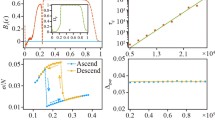Abstract
In this paper, we constructed three types of agents, which are different in efficiency and accuracy of learning. They were compared using acquired payoff in a game-theoretic situation that is called Minority game. As a result, different types of learning methods got the highest payoff according to the complexity of environmental change and learning speed.
Preview
Unable to display preview. Download preview PDF.
Similar content being viewed by others
References
Axelrod, R.: The Evolution of Cooperation. Basic Books, New York (1984)
Arthur, W.B.: Inductive reasoning and bounded rationality (the el farol problem). American Economic Review 84, 406 (1994)
Minority Game’s web page: http://www.unifr.ch/econophysics/
Zhang, Y.-C.: Modeling market mechanism with evolutionary games. Europhys. News 29, 51–54 (1998)
Challet, D., Zhang, Y.-C.: Emergence of cooperation and organization in an evolutionary game. Physica A 246, 407–418 (1997)
Marsili, M.: Market mechanism and expectations in minority and majority games. Physica A 299, 93–103 (2001)
Cavagna, A.: Irrelevance of memory in the minority game. PHYSICAL REVIEW E 59, R3783–R3786 (1999)
Author information
Authors and Affiliations
Editor information
Rights and permissions
Copyright information
© 2007 Springer Berlin Heidelberg
About this paper
Cite this paper
Izumi, K. (2007). Analysis of Efficiency and Accuracy of Learning in Minority Games. In: Sakurai, A., Hasida, K., Nitta, K. (eds) New Frontiers in Artificial Intelligence. JSAI JSAI 2003 2004. Lecture Notes in Computer Science(), vol 3609. Springer, Berlin, Heidelberg. https://doi.org/10.1007/978-3-540-71009-7_9
Download citation
DOI: https://doi.org/10.1007/978-3-540-71009-7_9
Published:
Publisher Name: Springer, Berlin, Heidelberg
Print ISBN: 978-3-540-71008-0
Online ISBN: 978-3-540-71009-7
eBook Packages: Computer ScienceComputer Science (R0)




